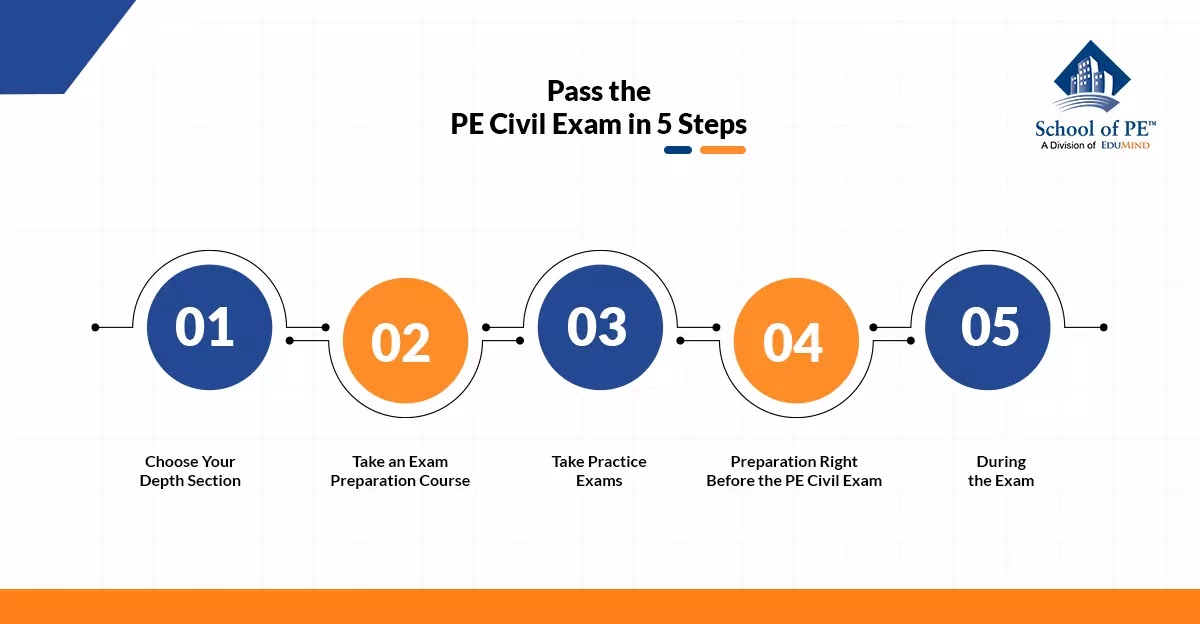Qualifying for, taking, and passing the PE Civil exam is a milestone in any civil engineer's career. Below are five steps to passing the PE Civil exam.
Table of Contents
1. Choose Your Depth Section
The PE Civil exam is made up of two sections: the breadth section and the depth section. Everyone taking the PE Civil exam will have similar questions and topics covered for the breadth section. These topics will include structural, water resources and environmental, geotechnical, transportation, and construction. The depth section focuses on specifically one of these topics. Questions for the depth section will generally take more time to solve and will require deeper analysis.
Choosing the right depth section is important, as the questions will make up half of the exam. People often ask which depth section is the easiest to pass, or which section requires the fewest reference books. My advice, and what I did, is to choose the topic that you are most familiar with. This topic could either be what your focus was in school or what your career has focused on since school.

2. Take an Exam Preparation Course
Probably the single most valuable preparation strategy I followed was investing a lot of time in a prep course. I chose an OnDemand course with School of PE and was able to work through the course at home and at work, all while on my own schedule. It is not enough to just simply try to get through the course. Instead, set aside and invest plenty of time to go through the lessons, mark and tab your reference material, work through practice problems, and then go back to focus on any areas in which you're lacking confidence.
I recommend procuring the recommended reference material early in the course or even before it starts. This will allow you to get familiar with the resources you'll use during the exam. I also recommend printing, binding, and marking any reference material the prep course provides, such as PDFs on individual topics. Make sure to follow exam requirements for taking in your own reference material including how it is bound, what it contains, etc.
3. Take Practice Exams
I recommend taking at least two or three practice exams after you complete the prep course. Follow the same schedule and setup that you will have at the exam. Find a quiet room where you won't be disturbed. Only make available what you will have on the exam. Treat the practice exam like the real thing.
After your practice exams, score your work to get an idea of your strengths and weaknesses, as well as what you can expect as far as difficulty and time required to solve problems. Go back and brush up on the areas that still need work!
4. Preparation Right Before the PE Civil Exam
As the exam date approaches, start preparing for the big day. Gather all the reference materials, two approved calculators (you don't want to find out your only calculator doesn't work during the exam), required identification, your exam registration paperwork, earplugs (some exam sites are not as quiet as you would hope), an approved watch (you might not be able to see a clock), and other approved items you might want.
Because you will need to get to the exam site early in the morning, decide if you want to spend the night before the exam near the exam site. This will allow you to hopefully get a good night's sleep and not have to worry about a long commute and traffic the morning of the exam.
5. During the Exam
Once the exam begins, I highly recommend a strategy for choosing which questions to answer first. My strategy was to briefly read through all the questions, marking them one through four. Number one questions were the quickest to solve (usually conceptual questions that I already knew the right answer to), and number four questions were those that would take the most time to solve. I started with all the number one questions, worked my way through two, three, and four. Even if you run out of time, following this strategy will maximize the number of questions you can confidently answer.
Keep track of time as you work through the questions. As you get near the end of the time for the breadth and depth sections, make sure you answer all of the questions. You aren't penalized for wrong answers, so make sure you mark something for each question before time runs out.
These five steps should provide some guidance to your PE Civil exam preparation efforts! Good luck!
No comments :
Post a Comment